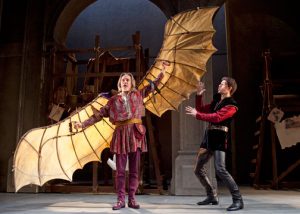Stars Collide With Dull Thrump
If Michelangelo and Leonardo da Vinci are arguing esthetics, we want to be there, right?
Well, it really happened, apparently, in 16th Century Florence, just after Michelangelo had finished his David and Da Vinci was starting his Mona Lisa. All Florence was abuzz, it seems, with their rivalry.
Too bad we have, not an eye-witness account, but only “Divine Rivalry,” a shambling play by Michael Kramer and D.S. Moynihan, now at the Old Globe Theatre in a production as gorgeous physically as it is soporific theatrically.

Miles Anderson as Leonardo da Vinci, left, and Sean Lyons as Niccolo Machiavelli in the Old Globe’s “Divine Rivalry.” Henry DiRocco Photo
The actors slouch and shout at each other. Their body language suggests confusion; their movement, resigned regimentation. As Michelangelo, Euan Morton skittles about, shrugging and wrangling like a shopkeeper. Leonardo, in the person of Miles Anderson, struts like someone who doesn’t know how and always seems about to waggle his finger foxy-grandpa style.
They argue in banal petulance over artistic ambiguity (Leo pro, Mic con), dispute technique like sophomore lab partners and, when each breaks down and admits that one of the other’s masterpieces ain’t bad, they are stolidly inarticulate.
Painters and sculptors have no mandatory poetical requirement but these are, after all, two of the geniuses around whom the concept of “Renaissance Man” was constructed. So we deserve more than doggerel.
The occasion for their meeting is a pair of commissions from the Florentine Republic’s busiest hustler, Niccolo Machiavelli, the same guy whose name is now synonymous with ruthless political scheming. He has the idea of a fresco show-down between Florence’s two greatest painters, each with a wall in the great hall and a separate famous battle. He hopes, somehow, that the result will help him raise a “citizen army” to replace the standard unreliable mercenaries, but the details of this scheme, like nearly everything else in this play, are lost in the gee-whiz diffidence. Sean Lyons plays the part like an apprentice wheeler-dealer too dull and disorganized for really effective results.
With only four characters to wield – David Selby plays a standard elder statesman – director Michael Wilson doesn’t try for much in the way of stage picture. The actors move and act predictably. Their exchanges are loud, direct and uninteresting.
If we didn’t have these four guys shuffling about shouting, “Divine Rivalry” might be remembered as a beautiful, fascinating show, worthy in fact of the subject.
Jeff Cowie has devised a row of formal arches with drops and wagons that fly and slide to move the scene briskly through Renaissance halls. The colors – parchment and faded-ink browns – are exciting and Peter Nigrini’s bold projections, borrowed from fecund period sources like Leonardo’s notebooks and Michelangelo’s sketches, are intoxicating. Somehow, Robert Wierzel’s lighting designs enhances the projections while washing everything in a warm, evocative glow.
John Gromada’s score, though heavy on the period lutes, sackbuts and loose drums, is not slavishly linked thereto but instead goes for lilting evocation. Snatches of themes are almost familiar but never intrusive and always invigorating.
Though everybody in this unfamiliar period looks plausible enough, David C. Woolard staggers a bit with the costuming, dealing with cues from the script. It would have helped to let a couple of these guys – especially Machiavelli – change outfits now and then.
What emerges here is a botched job of myth-borrowing. The test of such plays is whether they could be made to work if the characters were named Manny, Moe and Jack. (Not like Clarence Darrow, William Jennings Bryan and H.L. Mencken get renamed for “Inherit the Wind.” Everybody knows, presumably, who these guys really are.) Could one write a producible play about two glorious artists in competition to define their era? Probably not. The exposition would bog down before the characters could accumulate sufficient gravitas.
So you really need to be faithful and illuminating when borrowing the stars of history. If you can’t make Lincoln or Cleopatra or Confucius live then maybe you shouldn’t try.
[box]”Divine Rivalry ,” by Michael Kramer and D. S. Mpynihan, will continue at the Old Globe Theatre, Balboa Park, through Aug. 5, 2010. Tickets and information are available at TheOldGlobe. org or (619) 234-5623.[/box]

Welton Jones has been following entertainment and the arts around for years, writing about them. Thirty-five of those years were spent at the UNION-TRIBUNE, the last decade was with SANDIEGO.COM.
